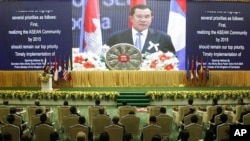Asean leaders say they will not “internationalize” the South China Sea issue, vowing after the first day of a major regional summit in Phnom Penh to continue discussions with China only.
The move would exclude any direct outside talks with the US or other countries, on the eve of the arrivals for an East Asia summit by US President Barack Obama and Chinese Premier Wen Jiabao.
“The Asean leaders decided that they will not internationalized the South China Sea from now on,” Kao Kim Hourn, secretary of state for the Cambodian Ministry of Foreign Affairs, told reporters after the meeting. “They will focus entirely within the current existing Asean-China mechanism, which are the levels of senior officials, the ministerial and the leaders, and where they will continue to engage in the discussion on the South China Sea.”
Asean has four states with overlapping claims to the sea with China, creating a point of potential conflict in a major international shipping lane. The US has said it has an interest in seeing peace and stability in the region, though it does not have claims there.
Analysts say China has little interest in taking on Asean as a whole over the issue, but would prefer bilateral talks with each of the states—Brunei, Malaysia, the Philippines and Vietnam.
Asean Secretary-General Surin Pitsuwan, of Thailand, told reporters Sunday that Asean leaders want the world to know they can tackle some of the region’s toughest problems without outside intervention.
“It is important for us to convey to the international community, to the world, that we may have differences, but we can manage and we are managing it, and we have the responsibility to manage it peacefully,” he said.
Asean leaders are working toward a Declaration of Conduct for the South China Sea, which would include a maritime code aimed at preventing conflicts.
Pitsuwan said Asean leaders expect discussions on the code of conduct “can be launched formally from here onward.”
The move would exclude any direct outside talks with the US or other countries, on the eve of the arrivals for an East Asia summit by US President Barack Obama and Chinese Premier Wen Jiabao.
“The Asean leaders decided that they will not internationalized the South China Sea from now on,” Kao Kim Hourn, secretary of state for the Cambodian Ministry of Foreign Affairs, told reporters after the meeting. “They will focus entirely within the current existing Asean-China mechanism, which are the levels of senior officials, the ministerial and the leaders, and where they will continue to engage in the discussion on the South China Sea.”
Asean has four states with overlapping claims to the sea with China, creating a point of potential conflict in a major international shipping lane. The US has said it has an interest in seeing peace and stability in the region, though it does not have claims there.
Analysts say China has little interest in taking on Asean as a whole over the issue, but would prefer bilateral talks with each of the states—Brunei, Malaysia, the Philippines and Vietnam.
Asean Secretary-General Surin Pitsuwan, of Thailand, told reporters Sunday that Asean leaders want the world to know they can tackle some of the region’s toughest problems without outside intervention.
“It is important for us to convey to the international community, to the world, that we may have differences, but we can manage and we are managing it, and we have the responsibility to manage it peacefully,” he said.
Asean leaders are working toward a Declaration of Conduct for the South China Sea, which would include a maritime code aimed at preventing conflicts.
Pitsuwan said Asean leaders expect discussions on the code of conduct “can be launched formally from here onward.”




